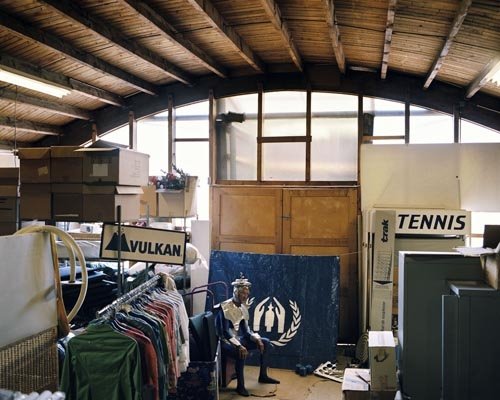Ives Maes
dal 7/6/2010 al 16/7/2010
Segnalato da
7/6/2010
Ives Maes
Uqbar - projectspace, Berlin
Unification. The central object in the exhibition, resembling a tent, is made of ordinary tarpaulin, a highly resistant material used as shelter against the elements and for protection. It carries the 'Reunited Nations' symbol, whose shape, colour and logo recall those of the actual United Nations flag but, in comparison to the original, a good deal of the continents' landmass is missing, with only the highest mountains still visible on the world map.

Ives Maes’ exhibition Unification at uqbar takes us to a dystopian world. Imagine if greenhouse gas emissions were impossible to stop, glaciers melted, sea levels rose, and most of the continents’ land was flooded by the ocean, as climate scientists predict may happen within this century. Entire nations would disappear, as well as 90% of the earth’s population. Welcome to a post-apocalyptic, flooded world.
The elements of the exhibition in Berlin are relics of a story to be reconstructed. The central object in the exhibition, resembling a tent, is made of ordinary tarpaulin, a highly resistant material used as shelter against the elements and for protection. It carries the “Reunited Nations” symbol, whose shape, colour and logo recall those of the actual United Nations flag but, in comparison to the original, a good deal of the continents’ landmass is missing, with only the highest mountains still visible on the world map. This is a vision of what the planet would look like from above if Antarctica melted and the ocean rose.
On the walls, large photos show enigmatic places, situations, and symbols referring to various kinds of post-emergency scenario. These are sites of former World Exhibitions such as Brussels Expo ’58, Osaka Expo ’70 and the All Russian Exhibit Park in Moscow. In the photograph Melosport (Expo ’58: Evaluation of the World for a more Humane World, 1958) a tent with the logo of the United Nations High Council for Refugees appears in the middle of an attic of a former Expo ’58 pavilion. In Banner (Osaka Expo '70: Progress and Harmony for Mankind, 1970) four people hold a banner that repeats the original and utopian subtitle-slogan of Expo ’70: “Progress and Harmony for Mankind”.
In both photographs expo slogans play an important role. Expo ’58 was the first Universal World Expo after World War II, it was a moment of excitation and belief in a positive future, and Expo ’70 marked an important era, as it was the first World Exhibition in Asia and a symbol of Japan’s pardoning and recovery. Very different was the All Russian Exhibit Park which was an expo exclusively for states of the USSR. This expo had a lifespan of over 50 years and grew to more than 200 pavilions, but the collapse of Soviet Russia marked the decline of the park. In the former Cosmos Pavilion there is now an impoverished people’s vegetable market; a huge portrait of Yuri Gagarin, the acclaimed Russian cosmonaut who as first travelled into space in 1961, is now covered with white sheets, only slightly visible. The remains of the expo sites reveal a slow disintegration of utopian visions and the dream of a better future.
As in earlier projects, such as the Recyclable Refugee Camp and the series of photographs of former World Expo sites, Ives Maes manages to highlight some crucial and odd aspects of the world today. Since the Recyclable Refugee Camp series the artist has been interested in the aesthetic and the officialdom of the UN, its humanitarian purposes and bureaucratic governance. With the Recyclable Refugee Camp project, in an attempt to produce a 100% ethically correct work of art, the artist focused on the UN prescriptions concerning refugee camps, according to which he built some prototype props using biodegradable materials.
In this exhibition, bearing the ironic title Unification, Maes nonchalantly displays the post-atomic, post-national, climate-changed world that we already inhabit. The artist imagines a world after the collapse of the United Nations and the establishment of a new entity, the “Reunited Nations”, comprising what is left of the former nations and continents after the ecological effects of global warming. Maes’ work, as the artist himself stated in a recent interview, is not really about an abstract future, it is critical research aided by reasonable quantities of fiction and speculative projection. Ives Maes does not consider himself a militant or political artist, yet the exhibition provides a strong statement; he delivers no judgment, draws no conclusions, only links different stories, information and sources. The result is a disturbing ensemble with mutations of flags and buildings that the viewer is left to decipher, with symbols evocative of an obsolete world order.
[From a text by Marina Sorbello]
The exhibition is funded with support from the European Commission and is part of the project Transient Spaces – The Tourist Syndrome.
Ives Maes (1976, Hasselt, Belgium) lives and works in Antwerp, Belgium. He studied sculpture at the Royal Academy in Ghent, Belgium and a post-graduate program at HISK, Antwerp. In 2008 he was a resident at Künstlerhaus Bethanien in Berlin. His work has been exhibited in contemporary art centers such as the SMAK in Ghent, Yerba Buena Center in San Francisco, Ludwig Forum in Aachen and the Museo de arte Carillo y Gil in Mexico City, Z33 in Hasselt, NAMOC in Beijing and Void+ in Tokyo.
Opening Tuesday, June 8, 2010, 7 p.m
uqbar
Schwedenstr. 16, Berlin
Hours: Friday - Saturday 14 - 18.30 and by appointment
free admission



